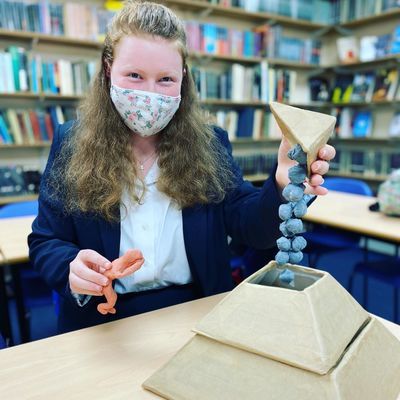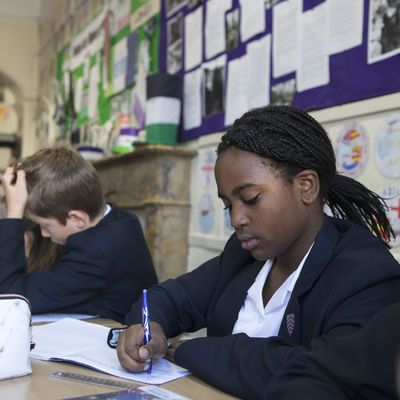“We believe that the advantages given by a classical element in education should be open to all students, and that every pupil gains from exposure to the languages and culture of the Ancient World.”
Classics is the study of the Ancient Greeks and Romans and anything to do with them, including their languages, Classical Greek and Latin.
Many schools are not able to offer these subjects, so at Hereford Cathedral School we are lucky to have two full-time teachers in the department.
We aim to provide stimulating courses which develop skills in language, communication, ICT, expression (written and oral), analysis and perception. These skills will help students in both their academic and general lives. We also aim to nurture a love of learning for its own sake.
We take a flexible approach to the study of Classics in Years 8 to 9, depending on individual experience and circumstances.
Year 8: You will take a taster course in Classics, exploring Greek mythology, religion and daily life. Highlights include enacting an Ancient Greek sacrifice! This introduction to the ancient world is a popular element of the Key Stage Three syllabus and often influences students in opting for Classical Civilisation when making their A-Level choices.
Year 9: You will be introduced to the Latin language at beginner level, as well as building your knowledge of Classical Civilisations. We currently use the Suburani text book along with its digital counterpart. Pupils who have studied Latin previously will be placed in an express set in order to keep learning at a pace which is suitable for them.
GCSE Latin: Latin is more than just a language! Latin is a discipline that will inspire you across the curriculum, both benefiting and complementing all subjects. You will discover the logic of language, it will improve your vocabulary, your confidence in using words, and your ability to write with accuracy.
GCSE Greek: The ultimate privilege. A fast-track course for high flyers – especially scientists, medics, linguists, lawyers. Only around 1500 candidates in the country enter for this exam, so you will really stand out if you take Greek. Students typically begin the subject in the lower school by attending Greek club, and take the GCSE in the sixth form. Speak to a member of the Classics Department if you would like to find out more.
See Sixth Form Curriculum for details of our A-Level Latin and Classics courses, plus GCSE Greek which can be studied in Sixth Form.
Classics Club: For students of all ages with an interest in any aspect of the Ancient World, Classics Club provides an opportunity to make like-minded friends and indulge your passion for mythology, Ancient History or anything at all to do with the Greeks and Romans. From building forts and making mosaics to playing Greek Gods top trumps and Kahoots or watching Disney’s Hercules, this club is run by the members for the members and can be whatever you want it to be. If you’re curious to find out more, ask a member of the Classics Department or simply come along to a lunchtime meeting.
Greek Club: Particularly popular with language enthusiasts for whom Latin is not enough, but open to all students from any year group, Ancient Greek club will introduce you to a new alphabet, the world of Greek Gods and mythology, and the origins of many of our everyday words. Initially a lunchtime club, pupils can progress as quickly as they choose to and many build their skills from scratch in the lower school to GCSE level or beyond by the sixth form. An ultimate privilege for the keen linguist and great addition to any UCAS form, or simply a fun and different approach to accessing the Ancient World – come along one lunchtime to find out more.
Classics Play: Written, directed and performed by Hereford Cathedral School's Senior Classics pupils in the summer term each year.
TRIPS
There is an active extra-curricular programme of trips to lectures, exhibitions and theatre productions which pupils attend on a voluntary basis, although attendance at performances of set texts is strongly advised. We greatly believe in the importance of experiencing Classics outside the classroom and take advantage of interesting opportunities as they arise. In recent years, attendance at the University of Warwick study days has been really influential in encouraging our students to pursue classical subjects beyond A-Level. We have also collaborated with other departments to visit Greece and Italy and hope to do so again in the future.

